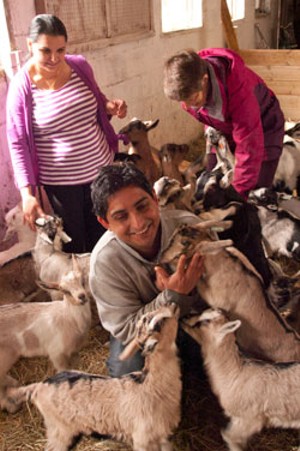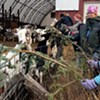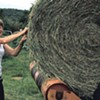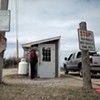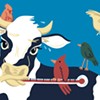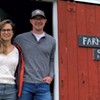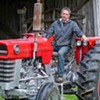Published April 3, 2013 at 9:18 a.m. | Updated June 27, 2017 at 3:07 p.m.
As refugees from Burma, Bhutan and Somalia made their homes in Vermont’s New American communities, they began searching for a meat that few supermarkets stock alongside the shrink-wrapped chicken, pork and beef — goat.
Goat may not be a staple of most Americans’ diets, but these hardy little creatures are widely considered the most consumed meat animal in the world. That doesn’t make it any easier for resettled families to track down the fresh, locally raised goat they say they prefer. Few Vermont farmers are savvy to the ethnic meat market, and fewer still can legally slaughter goats on-farm. A goat from Boston can cost as much as $300.
Whatever the source, the process is expensive, confusing and occasionally fraught with cultural miscommunication. One family stopped alongside the road to slaughter a goat purchased live from a Vermont farmer; when passing motorists got a look, they called the state troopers. No wonder that roughly 3000 frozen goats are imported each year to Burlington’s ethnic markets from Australia.
That may soon change, thanks to the Vermont Goat Collaborative, a team of two Bhutanese farmers raising goats to sell to Burlington’s ethnic communities. The program is the brainchild of Karen Freudenberger, a tireless community development volunteer working alongside refugee and conservation groups and Vermont’s ever-growing New American community. In this pilot year, the farmers will raise between 60 and 100 goats, mostly male kids that are the inevitable byproduct of goat dairy farming.
On a recent morning in late March, the kids — numbering 48, with the oldest clocking in at about three weeks — prance around a makeshift playground inside a former dairy barn in Colchester. They crowd atop tires and wooden planks, bouncing off each other — and their toys — with boundless energy.
“They are so happy,” says a proud Chuda Dhaurali, the 33-year-old lead farmer for the project. He oversees the herd along with his family and brother-in-law, 27-year-old Tika Dulal.
In a few hours, it will be feeding time again. After that, the farmers are expecting a visit from a large-animal veterinarian, who will vaccinate the goats and teach the Bhutanese farmers how to castrate the males.
In seven or eight months, customers will be able to come to the farm — located less than three miles from downtown Winooski — and select a goat for their dinner table. Assuming the collaborative can raise roughly $15,000 to construct a state-sanctioned slaughter facility, buyers may even be allowed to butcher the animal on-farm.
It’s a prospect the New American community is embracing with open arms: Bhutanese friends and relatives are already making frequent trips to Colchester to help the farmers and appraise the goats.
“People really could ride their bike there, get their animal, ride home and eat it for dinner,” says Freudenberger, a veteran of community development work in Madagascar who moved to Vermont in 2009 and has since made the goat collaborative her pet project.
“She has eaten, slept and breathed this project, and through sheer force of will, it’s all come together,” says Jennifer Colby, the outreach coordinator for the Vermont Pasture Network at the University of Vermont.
Freudenberger, along with a coalition of supporters including the Association of Africans Living in Vermont, the Vermont Land Trust and the Vermont Refugee Resettlement Program, is dreaming big. If this year goes smoothly, she imagines a network of small farm “pods” in which refugee families tend goats for supplemental income.
The goat collaborative sits on a high, windy bluff at the end of Pine Island Road in Colchester, a stone’s throw from the Winooski River. The VLT bought the 236-acre former dairy farm at auction last May for $535,600 and closed on it in late September. VLT vice president for land conservation Siobhan Smith says the property was a conservation priority because of its riverfront footage along the ecologically sensitive Intervale and its proximity to Burlington and Winooski.
The low-lying fields run the risk of flooding, making them unsuitable for most crops but excellent for grazing. In fact, Colby says that if farmers employ rotational grazing responsibly, goats could actually improve water and soil quality along the river by adding organic matter. Goat farming isn’t the only endeavor slated for the old Fitzgerald farm; AALV is also investigating the possibility of additional vegetable and rice production.
Dhaurali, Dulal and their families live rent free in the white farmhouse perched above the river, an arrangement that Smith says also benefits VLT, since the families serve as caretakers for the property. While VLT gets the goat collaborative under way, the organization and AALV are drafting a business plan for the farm. Smith says the nonprofit is committed to owning the property for at least three years while helping incubate the budding businesses. At that point, VLT plans to sell the property with a conservation easement — perhaps to the new goat collaborative.
This year, the farming project subsists on grant funding pieced together from individuals and organizations including Green Mountain Coffee Roasters and the New England Grassroots Environment Fund. Volunteers ranging from UVM fraternities to City Market co-op members have pitched in to clean the barn and tend the goats. Steve Reid, one of three co-owners of Brookfield’s Fat Toad Farm, is chipping in to provide advice, expertise and, most importantly, goats.
Fat Toad’s milking herd produces roughly 100 kids every March, and, aside from the few females the farm keeps to replenish its own herd, the rest need new homes. Reid expects the vast majority will head to Dhaurali from now on.
No one expects the goat collaborative to be a full-time job for Dulal and Dhaurali — or for any of the farmers Freudenberger envisions recruiting for an expanded version of the project. Dhaurali, who works as a cook at El Cortijo Taqueria y Cantina, has cut back one workday a week to make time for the goats, but he and Dulal view their venture as a source of supplemental income.
Freudenberger initially considered the farming project a natural fit for elders in the refugee community. They typically have the most farming know-how, she says, compared with younger individuals who spent formative years in refugee camps. Freudenberger remembers mentoring a Somali family whose elder, Mohamed, seemed particularly sad and withdrawn.
“I took it as a challenge. How can I engage this gentleman? So one day I just asked him, ‘So, Mohamed, did you ever have any animals?’” she says.
The man sat bolt upright and started telling Freudenberger about his camels, cows and goats. “His eyes just lit up, and he was a different person. It hit me harder than any day since … what a hugely important piece of people’s lives is missing when they come here,” Freudenberger says.
Dhaurali, who spent 18 years living in refugee camps in Nepal, likewise missed working with animals. Prior to his family’s expulsion from Bhutan, when Dhaurali was just 8, his father owned a 139-acre farm there. In exile, the family lived in a small, plastic-covered house made from bamboo and traveled outside the camp for days at a time to collect goats for market. Dhaurali grew fond of working with the animals and learned to recognize a healthy one when he saw it.
He recalls how families in the refugee camp sometimes smuggled one or two live goats into their homes to raise, in defiance of camp regulations. They foraged for the animals in the surrounding woods and hid them when authorities swept through.
Despite his experience, Dhaurali had never tended his own herd, so he spent a week last August training with Reid at Fat Toad Farm. In particular, he focused on the ins and outs of electric fencing; in Bhutan and Nepal, goats typically roam free.
“Chuda had no experience with fencing in that sense,” Reid says, “but I’ve learned a lot from him and have absolutely no doubt that Chuda knows things about goats that I haven’t learned yet.”
Dhaurali and Dulal say the first days after the goats’ arrival were the hardest. In Bhutan, goat kids stay with their mothers and nurse until they are weaned, but here the farmers had to teach the goats to drink from a bucket fitted with nipples. In the meantime, they fed the goats individually, which meant waking up as early as 3 a.m. before heading to work.
The load is lighter now. At feeding time, four times a day, the goats take willingly to buckets filled with kid-milk replacer.
And they’re thriving. “[Dhaurali is] infinitely patient and obviously really, really fond of them,” Reid says.
So is Dhaurali’s family. Inside the white farmhouse, his wife, Gita, is feeding breakfast to one of the other “kids” on this farm: the couple’s 15-month-old daughter, Jevenna. The cherubic, smiling toddler has spent much of the morning tottering around the farmhouse; when it’s time for a mid-morning jaunt to the barn, she exclaims with delight, “Bakhra!” — Nepalese for “goat.”
For Dhaurali, the new farm venture is a dream come true.
“I never thought, when I lived in Nepal, that I could be a farmer in America,” he says. If all goes according to plan, he won’t be the only one.
This article was headlined "Kids These Days" in print.
More By This Author
About the Artist

Matthew Thorsen
Bio:
Matthew Thorsen was a photographer for Seven Days 1995-2018. Read all about his life and work here.
Matthew Thorsen was a photographer for Seven Days 1995-2018. Read all about his life and work here.
Speaking of...
-

Q&A: Howard Fisher Delivers Meals on Wheels With a Side of Good Cheer
Dec 20, 2023 -

Video: Howard Fisher Delivers Meals on Wheels
Dec 14, 2023 -

Q&A: Alexis Dexter Rescued 57 Shelter Cats During the July Flood
Sep 13, 2023 -

Video: Two Months After the Flood, Alexis Dexter Rebuilds Kitty Korner Café in Barre and Continues to Rescue Cats
Sep 7, 2023 -

Video: Saying Goodbye to Burlington’s Penny Cluse Café
Nov 17, 2022 - More »
Comments
Comments are closed.
From 2014-2020, Seven Days allowed readers to comment on all stories posted on our website. While we've appreciated the suggestions and insights, right now Seven Days is prioritizing our core mission — producing high-quality, responsible local journalism — over moderating online debates between readers.
To criticize, correct or praise our reporting, please send us a letter to the editor or send us a tip. We’ll check it out and report the results.
Online comments may return when we have better tech tools for managing them. Thanks for reading.
































